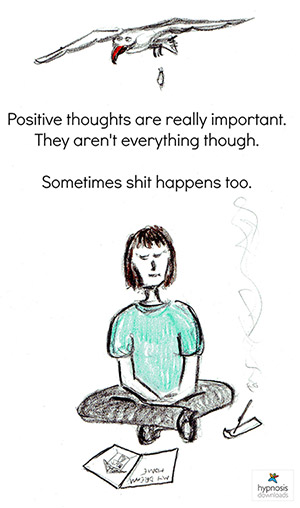Did you know the 'Law of Attraction' can actually stop you getting what you want?
Wanting and being positive is only a first step. It is not all you need.

Kelly had cancer. She was pale, thin, and frazzled looking. She had come to our workshop to learn self hypnosis. The participants were all asked what they wanted from doing the course. Kelly said: "I want to convince my mind that I want to live, not die."
"You need convincing?" I asked her during a coffee break.
"I must do," she said. "A person I respect very much told me that I probably got sick because I was giving out the wrong energy vibrations. My intention needs to change."
An idea might seem harmless but - just like a simple cigarette - can gradually undermine your very existence and send you off down the wrong path.
Kelly had stopped medical treatment. She had seen the movie The Secret, and read the book. Now she was attending all manner of shamanistic workshops and positive thinking seminars as a way of correcting her 'intentionality', hoping to manifest health back into her life.
Kelly was convinced that the blame for the cancer lay with her own 'negative intention'. She had never smoked. She didn't drink much. She led a healthy life, exercising frequently and eating a balanced diet. So it must be down to her 'intentionality', right? She had come to believe completely in the so-called 'Law of Attraction'. And now she was battling guilt as well as cancer.
But not all cancers are caused by smoking, or bad diet, or unhealthy life style. Shit happens too.
So what is this 'Law of Attraction', this 'Secret' (1) which (in the eyes of its more fanatical acolytes) I'm surely about to misrepresent?
Wishing and hoping and praying
The Law of Attraction sounds great. The idea is that we can get just what we want in life by maintaining positive thoughts; that believing in a positive outcome can 'attract' it from the universe. Cool! I'll have some of that.
Its followers - and there are millions - believe that this principle is supported by the discoveries of quantum physics, a claim roundly denied by scientists. Quantum theory is certainly amazing (and completely incomprehensible to most of us) but there is no evidence that it offers any grounds whatever for believing in The Secret.
This Law of Attraction didn't come out of nowhere. It has a pedigree.
The real and mythical origins of the Law of Attraction
As with much 'new age' ideology, highly appealing ideas are picked seemingly at random from a smorgasbord of beliefs from different times and cultures. Like tying a lot of birds together and hoping they'll fly.
So the Law of Attraction is an eclectic mix of half-baked ingredients, with a dash of Vedantic Karma, a smidgeon of sympathetic magic, a sprinkling of theosophy, a garnish of Jungian synchronicity, a smattering of Christian Science, and a side order of Napoleon Hill (of Think and Grow Rich fame).
Even the mysterious ancient Egyptian (some would say mythical) "thrice-wise" Hermes Trismegistus has been roped in and lauded as an early advocate of the Law of Attraction. This is a bit like attributing the discovery of how to do simple multiplication to Albert Einstein and hoping he'd be pleased; because whoever wrote the Asclepius and the Corpus Hermeticum seems to have been a rather profound and subtle thinker.
In spite of all that, I don't think the Law of Attraction is entirely bogus.
A smattering of truth
 The trouble with the Law of Attraction is that it makes us surrender responsibility to 'the universe' rather than assuming it ourselves
The trouble with the Law of Attraction is that it makes us surrender responsibility to 'the universe' rather than assuming it ourselvesLike all seductive ideas, there really is a grain of truth in the Law of Attraction. But this 'secret' has taken a tiny particle of truth and turned it into a huge belief industry all of its own... The power of optimism and placebo (and its evil twin nocebo) are well documented (2). But something which is partially true in some contexts can turn dangerous when held to be absolutely true in all contexts.
People will say that I'm being unfair here. After all, thousands of people attest to the power and practicality of the Law of Attraction; many claim it's changed their lives, no less. They wear their adherence to it on Facebook like some tribal badge. Why is this?
It's true because it seems true for me!
Imagine 200,000 people kiss their personal lucky charm every week before filling out their lottery ticket. One of these charm kissers actually wins the lottery. Now they have 'proof' that kissing a lucky charm pours barn-loads of cash into your life.
Proof by selected instances seems powerful and dramatic and true. Lots of people swear by The Secret, but that doesn't make it real. People have 'sworn' that certain other people were witches, that this or that potion has healing power, that the world is flat because... well, it seems pretty flat when you go outside.
The fact is that anecdotal evidence can be found for pretty much anything, including alien abduction. I'm a great advocate of the use of hypnosis in psychotherapy - which is largely about helping people change their expectations - but I'm an equally big fan of controlled studies into the efficacy of such an approach. Anecdotal evidence might reflect reality, but it doesn't necessarily do so.
As Tim Browning of adaringadventure.com points out, in his provocatively titled article 'Is the Law of Attraction a Con?' not being able to disprove something doesn't mean you've proved it.
And there are other reasons why people believe in the Law of Attraction.
Beliefs are infectious
Belief spreads. We believe stuff that other people believe - or at least large numbers of us do. Beliefs can become 'viral', jumping from person to person without real thought or analysis, and the greater the number of people who believe something, the more 'true' it can seem. A good question to ask yourself is: If no one else believed this and I heard about it from just one person, would I be prepared to believe it?
The dread of helplessness
We all need to have a sense of meaning and a sense that we have some control over things. The anxious expectant father pacing back and forth in the labour ward isn't really any help to his partner giving birth - but he feels that at least he's doing something!
Our legitimate human emotional needs for purpose and control can make us willing to subscribe to dubious ideas or movements because they meet the need, and meeting the need can feel vastly more important than questioning the basis of the idea.
And if those ideas continue to meet that need, we are most reluctant to abandon the belief, however shaky a foundation it may have.
This extremely common pattern of behaviour has only relatively recently been fully recognized in psychology - although I'm sure Shakespeare alludes to it somewhere!
I think that with all the psychological knowledge now so widely available, we are, for the first time in history, in a position to do much better than this.
What's wrong with believing in the Law of Attraction?
But surely, I hear you say, if the Law of Attraction seems to work for people, then where's the harm in it? Why don't I just let them get on with it, if they want to?
Well, I think there are some seriously damaging aspects of adhering to the Law of Attraction, however you look at it.
Wanting something too badly might stop you actually getting it
Some friends and I once applied to go on a UK team quiz show and got a place. I didn't have any particular ambition to win, nor did my friends, we didn't care at all about it, we were just doing it for a laugh. We got selected because the producers thought we seemed 'natural'. That sounds exactly like a 'proof by selected instance', and it is. But it's also an idea you may relate to. When you don't care whether you get a job, you seem to get it. Ever noticed that?
So it seems that, in some ways, caring too much can sometimes get in the way of the performance that you need to pull off in order to actually achieve something. When I work with sports professionals, I need to help them achieve a state of 'flow' to 'get in the zone' - a wide awake trance-like state which relies upon not wanting too much.
Some interesting research has found that visualizing what you want can actually make you less likely to achieve it (3). Daydreaming about future success makes us more passive, it seems. The use of visualization - or, indeed, hypnosis - needs to be focussed on the practical steps we need to take rather than just the 'manifestation' of our desires (4).
The real psychological - or in Kelly's case mortal - danger of adhering to the Law of Attraction may lie precisely in the passivity this kind of research has highlighted.
So what does the universe want from us, for heaven's sake?
The 'spiritualization' of the American Dream
Focussing night and day on what you want may indeed help you achieve it. Not because of vibrations from your brain, mind or soul, but because - consciously and subconsciously - you're engaging in behaviours that will make you more likely to get that new car, job, business or partner.
But the trouble with the Law of Attraction is that it makes us surrender responsibility to 'the universe' rather than assuming it ourselves. 'Positive' passivity, waiting for 'manifestation', is still passivity - and ultimately there's nothing genuinely positive about that.
A very few people do become accidentally rich; it does happen. But most have to work hard, develop real practical strategies and put them into action. If the universe can lend a hand with that, all well and good - but it wants some effort from us too, I'm guessing.
I don't know that the universe even needs more millionaires. If the universe is evolving (as seems to be the case), is more people having loads of cashola some integral part of that process? Does the universe (which is quite big) run along the principles of the American Dream?
I think some people have been sold short.
Help yourself vs self help
I saw a TV show recently about people who were trying to become millionaires through real estate. One woman had got herself deep in debt by attending expensive positive intention seminars run by lots of smiling successful-looking people in smart suits.
The TV crew followed her morning ritual. She started each day by holding in her hand and gazing lovingly at a cheque she'd written out for herself, by herself, for one million pounds. A cheque which would certainly have bounced higher than a dam buster bomb if she'd tried to cash it.
Then she would repeat positive get rich affirmations to herself, over and over, sending out the positive vibes. She had a beautiful smile beneath her desperate eyes.
And that was it. That was her 'method' of becoming rich.
Now, I'm not that well acquainted with 'the universe', but I somehow doubt that 'the universe' is going to have much respect for these kinds of efforts toward financial material progress.
I think the universe (if it has an opinion at all) would be much more likely to respect and respond to real effort.
Whatever happened to "God helps those who help themselves"? Or, if you're not of a religious persuasion, "Fortune favours the bold"?
How to get rich - here's my top tip
If you really want to get rich, pluck an attractive idea that can be shown to have some truth some of the time and sell it on as a perennial and universally applicable principle.
Unless you have some integrity. In which case, don't.
Let's move on from this cult
People want all kinds of things that aren't necessarily what they need,and it takes considerable humility to admit that to oneself. The universe can have little interest in 'manifesting' human greeds over human needs.
Heck, do you seriously think millions of people haven't starved to death or died of thirst while really wanting, wishing and visualizing the universe give them food and water? Which it didn't?
Were they not really committed to their own survival? Was it their fault? Was their desire for sustenance less intense than my yearning for a new Mercedes?
Yes, the mind does need a clear direction in which to travel. And it's often better to focus on what we do want rather than just on what we don't want. But wanting and being positive is only a first step. It is not all you need.
If connecting to the spiritual dimension is a genuine possibility, I doubt it will be anything as simplistic as 'really wanting something' and then 'sending out positive vibes' into the ether. This seems to me a cult of thought that will actually render people more passive, less self sufficient, and less 'empowered'.
For the sake of human progress, I think it's high time we collectively moved on from these primitive forms of belief. I reckon we can do better than this. There is so much genuine, tested knowledge available to us, it's actually tragic that so many of us are still prepared to settle for unsophisticated, superstitious, cause-and-effect belief systems that really belong to more primitive times.
Genuine understanding and progress is blocked when people misuse scientific knowledge (such as quantum theory) to promote superstition. It's no different from the cargo cults (5) of non-industrialized tribal people who believe their ritualistic practices 'cause' the manifestation of manufactured goods among them - which in reality are produced by industrialized nations that have dumped them in the sea.
Do we, on an individual level, really want to surrender to the primitive emotional parts of our minds? Or can we develop and grow beyond them?
The real secret to life, I suspect, is going to be far more subtle and interesting than the obvious nonsense of The Secret.
Notes:
- The Secret is a 2006 film and book extolling the Law of Attraction.
- See: Placebo hypnosis.
- See: The motivating function of thinking about the future: Expectations versus fantasies. Oettingen, Gabriele; Mayer, Doris.
- See: From Thought to Action: Effects of Process-Versus Outcome-Based Mental Simulations on Performance Lien B. Pham University of California, Los Angeles and Shelley E. Taylor University of California, Los Angeles.
- See: Wikipedia entry on Cargo Cults.






